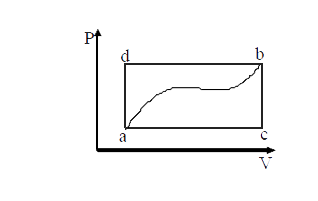In a thermodynamic system working substance is ideal gas, its internal energy is in the form of
A
potential energy only
B
neither kinetic nor potential energy
C
kinetic energy only
D
kinetic and potential energy
Video Solution
Text Solution
The correct Answer is:C
For an ideal gas, there are no intermolecular forces of attraction. Hence the P.E. is zero. Hence the internal energy is only in the form of K.E.
|
Updated on:21/07/2023
Topper's Solved these Questions
- BOOK - MARVEL PUBLICATIONCHAPTER - KINETIC THEORY OF GASES ,THERMODYNAMICS AND RADIATIONEXERCISE - TEST YOUR GRASP - 930videos
KINETIC THEORY OF GASES ,THERMODYNAMICS AND RADIATION
- BOOK - MARVEL PUBLICATIONCHAPTER - INTERFERENCE AND DIFFRACTIONEXERCISE - TEST YOUR GRASP20videos
INTERFERENCE AND DIFFRACTION
- BOOK - MARVEL PUBLICATIONCHAPTER - MAGNETIC EFFECTS OF ELECTRIC CURRENTEXERCISE - MCQ195videos
MAGNETIC EFFECTS OF ELECTRIC CURRENT
Similar Questions
Knowledge Check
- Question 1 - Select One
During isothermal expansion of an ideal gas, its internal energy
AdecreasesBincreasesCmay increase or decreaseDremains unchanged. - Question 2 - Select One
During isothermal expansion of an ideal gas, its internal energy -
ADecreasesBIncreasesCMay increase or decreaseDRemains unchanged - Question 3 - Select One
We consider a thermodynamic system. If ΔU represents the increase in its internal energy and W the work done by the system, which of the following statements is true?
AΔU=−W in an isothermal processBΔU=W in an isothermal processCΔU=−W in an adiabatic processDΔU=W in an adiabatic process
Heat equivalent to 30J is supplied to a thermodynamic system and 10J of work is done on the system. What is change in its internal energy?
View SolutionWe consider a thermodynamic system. If ΔU represents the increase in its internal energy and W the work done by the system, which of the following statements is true?
View SolutionDuring isothermal transformation of an ideal gas, internal energy
View SolutionIf an ideal gas is isothermally expanded ,its internal energy will
View SolutionIf an ideal gas is isothermally expanded its internal energy will
View Solution


